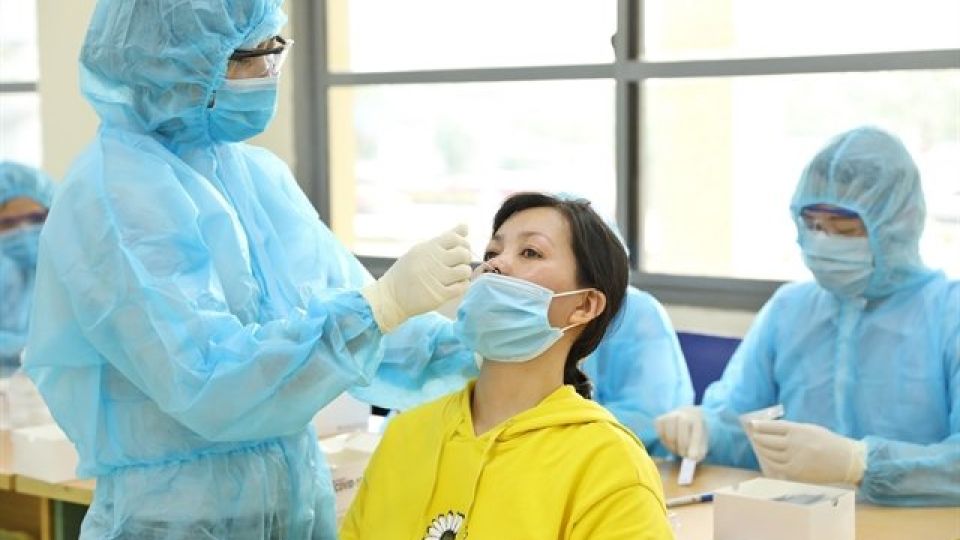October 26, 2023
HANOI – The health ministry has formally reclassified COVID-19 from Class A to Class B. This means daily case reporting will cease and free treatment will no longer be provided, although wearing masks continues to be advised.
According to the latest decision by the Government and the Ministry of Health, as of October 20, COVID-19 is no longer part of the group of extremely dangerous infectious diseases with the potential for rapid transmission, widespread distribution, and a high death rate or unclear pathogens (which include polio, influenza A-H5N1, plague, smallpox, Ebola, Lassa and Marburg hemorrhagic fever, West Nile fever, yellow fever and cholera, etc), but has officially been reclassified as a disease in Class B, which is a group of dangerous infectious diseases with the potential for rapid transmission and the possibility of causing death (including HIV/AIDS, influenza, rabies, pulmonary tuberculosis, dengue, hand-foot-mouth disease, measles, etc.)
Explaining this adjustment, Professor, Doctor Phan Trọng Lân, Director of the Department of Preventive Medicine under the health ministry, said that the reclassification decision was based on a comparison of the regulations in the Law on the Prevention and Control of Infectious Diseases and the practical development of the epidemic in Việt Nam.
The data showed that COVID-19 no longer met the criteria for a highly contagious disease in group A.
In 2023, the number of COVID-19 cases decreased by 82 times compared to 2022, and the death rate among those infected is 0.022 per cent, which is nearly 100 times lower than in 2021, when the country witnessed severe outbreaks while vaccination rates lagged until the latter months of the year.
The pathogen of COVID-19 has been clearly identified as the SARS-CoV-2 virus.
COVID-19, therefore, now meets the criteria for a dangerous infectious disease in group B as defined in Article 3, Section 1 of the Law on the Prevention and Control of Infectious Diseases, according to the doctor.
However, the medical official cautioned that the virus was still continuing to mutate, so monitoring of the disease must continue. Furthermore, surveillance of COVID-19 should be integrated into the monitoring system for respiratory pathogens and other infectious diseases.
Regular risk assessments should be conducted, and corresponding response measures should be implemented to prevent and control outbreaks at different risk levels.
Trần Đắc Phu, senior expert of the Việt Nam Public Health Emergency Operation Centre, said with the new classification, there would also no longer be a need for daily COVID-19 figure reporting. The reporting would be done in line with protocol for Class B diseases.
He also noted that the reclassification was now mostly just a procedural issue, as life had completely returned to pre-pandemic norms with no restrictions left.
Masks still recommended
Despite the downgrade, Lân said since there were still many other infectious diseases besides COVID-19, people should continue wearing masks in public and crowded places to protect themselves from other types of infections.
Individuals who have COVID-19 should wear masks for 10 days from the onset of the illness, and those caring for COVID-19 patients, even at home, should also wear masks.
Nguyễn Trọng Khoa, Deputy Director of the Department of Examination and Treatment Management under the health ministry, also advised that people and healthcare workers should continue wearing masks at healthcare facilities because, apart from COVID-19, there are other disease-causing agents that can be avoided by wearing masks.
There is currently no regulation regarding mask removal at healthcare facilities.
He also said that the treatment regime for COVID-19 was still being maintained in accordance with the latest guidelines issued by the health ministry in June 2023. This protocol has been updated with treatment recommendations and patient management plans to adapt to the evolving situation.
According to Khoa, most COVID-19 field hospitals across the country have been dismantled. The one built in Hoàng Mai District, Hà Nội, under the management of the Hà Nội Medical University Hospital, is being considered to be repurposed to receive normal patients as per the hospital’s request. The No.13 field hospital in Bình Chánh, HCM City, is still active and ready to receive COVID-19 patients in case of pandemic resurgence or new variations, but after consideration of the COVID-19 situation, the health ministry and the HCM City’s health department will also consider dissolution or conversion of the hospital’s purposes.
Regarding COVID-19 vaccination, Lân noted that the vaccination programme needed to continue to be monitored.
There is currently no recommendation for annual COVID-19 vaccination. However, in the future, depending on the actual situation, the World Health Organization may issue new recommendations.
According to the plan for 2023, COVID-19 vaccines are still administered free of charge, and in the following years, new recommendations may be made by the health ministry based on real-life developments.
Treatment costs
Regarding the payment of COVID-19 treatment costs, Phan Văn Toàn, Deputy Head of the Health Insurance Department under the health ministry, said that hospital fees would be calculated in two ways.
For the patients who were admitted to the hospital for treatment before October 19, or before the day of the COVID-19 reclassification, the State budget would cover the costs of treatments.
Patients who are hospitalised for COVID-19 examination and treatment from October 20 onwards would have their health insurance cover part of the expenses, and the patients would also pay part of the cost. Patients who do not have health insurance would be responsible for the entire cost.
Patients seeking COVID-19 examination and treatment should adhere to the regulations. Patients who seek care at the appropriate healthcare facilities would be entitled to full health insurance benefits as stipulated by the health insurance law.
If patients seek care at healthcare facilities that are not the designated providers, they would receive less support or might not receive any support, Toàn said. — VNS


